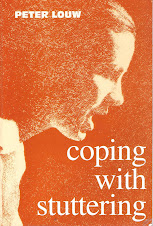* Situational Stress - for example the telephone, public speaking, ordering food in a restaurant, talking to a shop assistant etc. This type of stress is learned, as are the majority of stress types.
* Word or Sound Stress - also learned, and reinforced in the course of time. Often it is the result of fear of words / sounds. If you stutter repeatedly on a particular word or sound, you will eventually begin to associate that word / sound with unpleasant emotions, and you will develop an accompanying fear.
* Authority Figure Stress - talking to an employer, teacher, preacher, parent, lecturer, police officer, senior government official etc. These individuals wield power and authority which could be used by them to your detriment. So these people are potential threats - and threats are a well-known cause of stress.
* The Stress of Uncertainty - eg. when talking to strangers, or in a new job, a new school, a new language, a strange country etc., or when saying things that are unpopular. Newness also involves a threat (of not being able to manage the new challenges, or not knowing the appropriate behaviour in the new situation).
* Physical Stress due to exhaustion or illness.
* The Stress of Bad News, eg. discovering that your car has been stolen, or hearing that a relative is seriously ill.
* Speed Stress - caused by speaking too fast. This stress plays a very important role in stuttering. The quicker the speech, the higher the tension on the vocal folds.
* Communicative Stress - this is the pressure on the speaker to be heard and understood. A person's speech is often better when he says or reads something familiar to the listener and if he knows that the listener is aware of the facts. This relieves the pressure on the speaker to convey the message and reduces his communicative stress. Another example: a stutterer may say a sentence fluently, but if you ask him to repeat it, he may stutter - because the request to repeat himself increases his communicative stress.
* Linguistic Stress. Speech and language are interrelated. Most stuttering occurs at the beginning of sentences or words. Stuttering also occurs more often on the emphasised syllable of a word, and on key words such as nouns, verbs and adjectives rather than on more neutral words such as prepositions, conjunctions and articles. All this happens because the vocal folds are under greater pressure in these circumstances.
* Emotional Stress - caused by feelings of frustration, fear, worry, anxiety, guilt etc.
Often several types of stress may impact on the individual. The total of all the different tensions affecting an individual at a given moment is known as base-level Tension. Base-level Tension is the TOTAL TENSION on the vocal folds when a person is NOT speaking or does NOT intend to speak.







Excellent post. This stuff is really interesting. I never thought about different kidn of stresses...
ReplyDelete